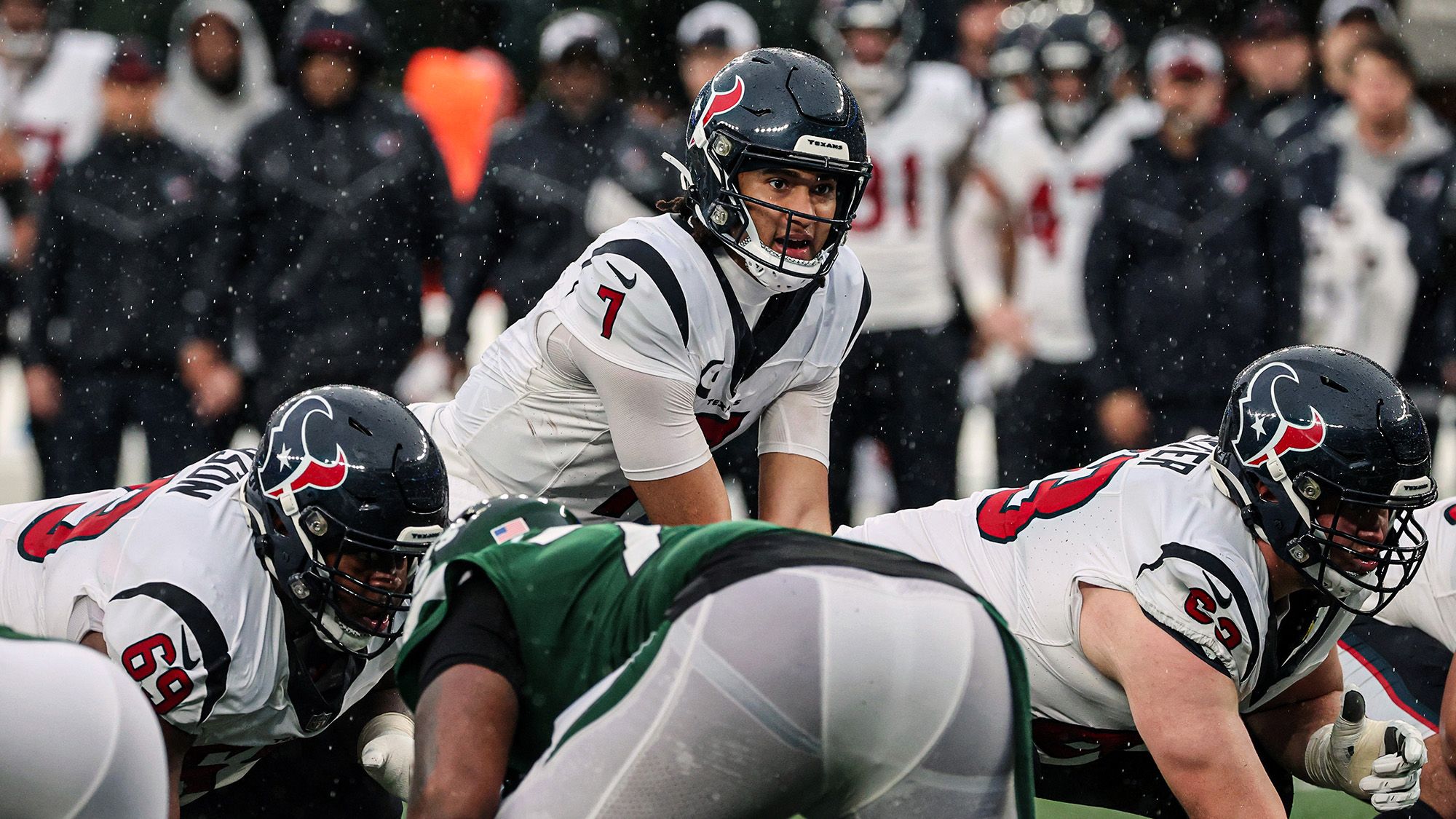With the New York Jets’ playoff chances dwindling, the team gets the Halloween treat of facing C.J. Stroud and the 6-2 Houston Texans in yet another nationally televised game.
Many Jets fans are dreading another prime-time defeat, but New York has a shot to pull off the upset with numerous key Texans players sidelined. Wide receivers Stefon Diggs and Nico Collins will miss the game, along with Houston’s second-leading tackler, linebacker Azeez Al-Shaair. If the Jets want to make a miracle push to the playoffs, they have a unique chance to get it started on Halloween.
If the Jets are going to get their season back on track before it goes completely off the rails, they must follow these three keys to success.
Blitz consistently
It is a massive relief for the Jets’ secondary that the Texans will be without Collins and Diggs. That said, the Jets must continue to blitz often, as they have in prior weeks.
Since Robert Saleh’s firing, interim head coach Jeff Ulbrich has deployed six-man fronts at nearly triple the rate (5.4% to 14.5%) and has sent six or more rushers at a higher rate as well (8.4% to 12.4%).
Ulbrich must trust the secondary and continue blitzing at a high rate to help out the Jets’ struggling run defense. They have allowed an average of 7.8 first downs per game on the ground, which ranks 23rd in the league through the season’s first eight weeks.
The unit does not have an easy task this week as they must contain Joe Mixon, who has emerged as one of the league’s most explosive running backs this season. Mixon has generated 107 rushing yards over expected this season, the 9th-most in the NFL. No Texan has reached 100 RYOE through the first eight weeks of a season over the past seven years; he has also recorded an explosive run on 15.7% of attempts this season, the highest rate among any Texans running back since 2016 (minimum of 50 carries).
Mixon thrives at hitting the line of scrimmage with a head of steam, which can be problematic for a Jets team that struggles with tackling. The former second-round pick has averaged 10.50 mph at the line of scrimmage in 2024, the highest rate among Texans running backs since 2016 and the 10th-fastest speed in the league this season (minimum of 40 carries).
To give the Jets’ run defense the best chance of stopping Mixon, Ulbrich needs to continue blitzing heavily, as it will bring more defenders into the box to stop the run. With Diggs and Collins out, Ulbrich must trust the secondary to hold up with fewer defenders in coverage.
Create interior defensive pressure
The interior of the Texans offensive line has struggled this season, and the Jets must exploit this weakness on Thursday night.
The interior of the Texans’ offensive line has allowed a combined 15.5 sacks this season, the most in the NFL. They have also allowed 30 total quick pressures, tied for the most allowed by an interior OL.
This gives defensive tackle Quinnen Williams a perfect opportunity to cause havoc, which is what he has been doing recently despite a slow start to the season. After generating just eight pressures through the first four weeks of the season, Quinnen Williams has since generated 15 pressures, tied for 2nd-most by any defensive tackle over that span.
Williams also generated six of those pressures under 2.5 seconds, tied for second-most among defensive tackles since Week 5. The Texans’ interior offensive linemen have allowed 79 pressures this season, the fourth-most in the NFL.
Quick passing
The Texans possess one of the league’s most robust pass-rushing defensive lines.
It starts on the interior. Tim Settle and Folorunso Fatukasi are the only defensive tackle duo to post a pressure rate of over 12% this season (minimum 100 pass rushes).
On the edge, Danielle Hunter (51) and Will Anderson Jr. (39) rank within the top five in pressures generated this season, making them the only teammate duo within the top 15. Hunter has been particularly good at getting to the quarterback quickly, generating 20 of his 51 pressures under 2.5 seconds. He is one of two players to generate 20+ quick pressures this season, behind only Myles Garrett (21).
Despite struggles with the offensive line, the Jets have been able to negate pressure by getting the ball out quickly. Aaron Rodgers is averaging only 2.56 seconds from snap to throw, which ranks third-fastest among quarterbacks with at least 150 dropbacks. Rodgers must continue to make quick decisions on Thursday night to prevent Houston’s pass rush from making noise.

